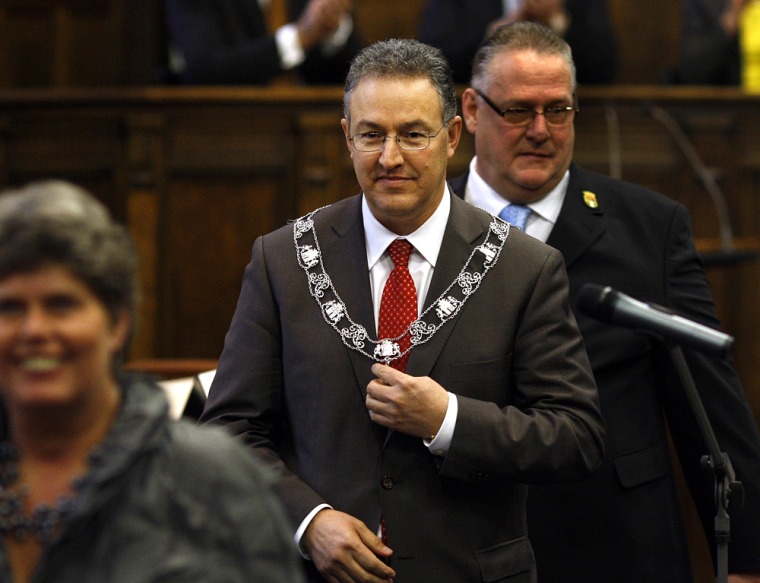The son of an Islamic preacher became the first Moroccan-born mayor of a Dutch city Monday, an appointment welcomed by his political friends and foes as a landmark in the successful integration of immigrants.
Ahmed Aboutaleb, a 47-year-old former journalist, has been compared to U.S. President-elect Barack Obama for breaching barriers that have long kept immigrants out of the Dutch corridors of power.
"I think it's a turning point in Dutch history where integration has evolved to a level where people of Moroccan descent or Turkish descent are able to have the qualifications and the networks to become a mayor or a minister," said Sadik Harchaoui, the head of Forum, an institute dedicated to promoting integration.
About 1 million of the country's 16 million people are immigrants.
Jan Franssen, Dutch Queen Beatrix's representative for South Holland province, played down the comparison with Obama.
"Obama on the Maas ... is maybe going a bit far," he said, referring to the river that bisects Rotterdam. "But the significance is great. This proves that there is no glass ceiling for immigrants in the Netherlands."
Anti-immigrant backlash in past
Just a few years ago, the country — once one of Europe's most welcoming — was in the grip of an anti-immigrant backlash triggered by the murders of two of the country's most prominent critics of Islam.
In 2002, the firebrand politician Pim Fortuyn, who used anti-Islam rhetoric to build a power base in Rotterdam's blue-collar neighborhoods, was gunned down by a man who accused him of victimizing Muslims.
Two years later, a Muslim extremist shot and slashed the throat of film maker Theo Van Gogh because he considered Van Gogh's film "Submission" blasphemous to Islam.
The killings shocked a country that had long prided itself on its tolerance and caused a fundamental reconsideration of the way immigrants were treated.
Where once they were allowed to congregate in insular communities in rundown neighborhoods, often without learning Dutch, the buzzword now is participation — getting immigrants to play an active role in society.
"We have moved on from the time of Fortuyn," said Harchaoui.
Marco Pastors, who leads a Rotterdam political party faithful to Fortuyn's teachings, grudgingly welcomed Aboutaleb's appointment.
"He is morally upright and thinks immigrants must adapt to our Dutch values," Pastors said. "He believes that they must take the chances the Netherlands offers and not sink into the role of victims. He can say what many do not dare say: 'If you don't like it here, then pack your bags.'"
Addressing tensions
Aboutaleb signaled he would tackle tensions between the city's white Christian population and its growing Islamic immigrant community.
"Many people feel insecure in a world in which everything is changing," Aboutaleb told aldermen at City Hall.
"There are no more jobs for life. Money can evaporate, churches disappear, mosques appear," he said. "We must not make light of these feelings of fear and insecurity."
Aboutaleb resigned as deputy minister for social affairs in Prime Minister Jan Peter Balkenende's government to take over in Rotterdam, which, with 585,000 people, has the largest proportion of immigrants of any major Dutch city.
Before joining the national government in 2007, Aboutaleb was an alderman in Amsterdam, where he made his mark in the tumultuous aftermath of Van Gogh's murder.
With tensions soaring and anger toward the city's Moroccan and Turkish immigrant populations rising, Aboutaleb went to one of the city's most prominent mosques with a blunt message for worshippers: integrate or leave.
While Pastors praises that stance, he also challenged Aboutaleb, who has dual citizenship, to turn in his Moroccan passport as a sign of his commitment to the Netherlands. Aboutaleb refused to relinquish his passport when similar calls followed his appointment to Balkenende's Cabinet.
Pastors presented the new mayor with a gift of an envelope addressed to the Moroccan king and urged him to use it to send back his Moroccan passport.
"Your position in this country brings this moral obligation with it," he said.
